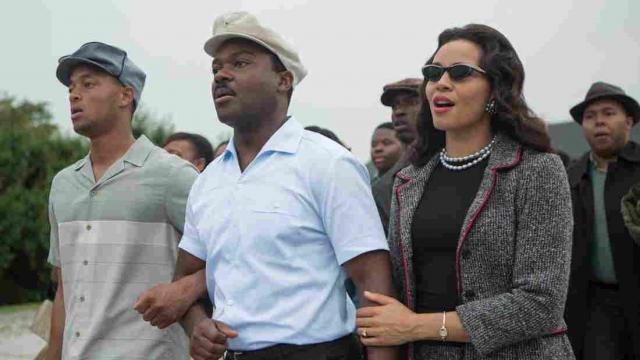"Selma" Review
Gallery

This years “Selma” is not a bio-pic of Martin Luther King Jr.’s life. It is more a vignette from his life focusing on one particular event; the 54 mile march from Selma to Montgomery, Alabama. In 1965, at the time of this display, King had already given his ‘I Have a Dream’ speech and blacks had already gained the right to vote nearly 100 years earlier under the 15th Amendment. However, as this film portrays, African-Americans would be harassed if they tried registering to vote. In an early scene Annie Lee Cooper (Oprah Winfrey) is asked to recite the preamble, which she does. She is then asked increasingly harder questions about Alabama politics until she is asked to name all the circuit judges. She cannot and is sent away defeated. Legally allowed to vote, but not allowed to vote. Martin Luther King Jr. (David Oyelowo) is a prominent figure in politics at this point and a proven force in social change. He meets with President Lyndon B. Johnson in attempts to further advance the station of African-Americans in the 1960’s, and he strongly believes that the unhindered right to vote is what is called for. Johnson negotiates him down, stating that the time isn’t right. King decides that it is time for action.
King is well known as a non-violent activist which is true and at the core of much of his philosophy. Though, the point is made in the film that non-violence should not be confused with passive. He inspires his followers to assemble and register to vote, together. Every attempt is met with violent resistance and although segregation is outlawed federally, things don’t seem too much different in the south and especially Alabama. Protestors are hurt and killed by angry law enforcement inspiring citizens across the U.S. of varying race and creed to unite in this demonstration.
“Selma” is interesting because it is not a biographical account of King’s life, but mainly focuses on this one objective of his: voting rights for blacks. This lets the events play out in a more fleshed out manner than it probably would have if the writer tried to cram all the events of his life into a two hour block. Various details of his history and harbingers of his future are weaved throughout though. He was a powerful and eloquent speaker and that is represented well, but we already knew that about King. I was surprised to see them include the account of Coretta Scott King, King’s wife, forced to listen to the sounds of her husband in the throes of an affair on a tape sent to her courtesy of J. Edgar Hoover. “They want to discredit me in an attempt to discredit the cause.” King laments in his jail cell. A man that in many ways has become larger than life in our public conscious today, is given a very human treatment in this film. We hear him fly into a fit of rage upon hearing of talk of Malcolm X wanting to join forces. We also get to see him be just one of the guys joking around with his friends in an early scene.
David Oyelowo brings great life to King without at all appearing to be performing an impersonation. Oftentimes it seems a figure like Martin Luther King Jr. is portrayed on film as an unstoppable force and unflawed. I always find this cheapens any ultimate payoff and here we see a man who is struggling to find the right way to lead his people as opposed to just knowing it.
There are many cameos throughout the film, both of famous actors and of political figures of this time-period. The direction is only subtly styled with the focus on the film’s star. “Selma” was quite steady paced with a lot of interesting background on an icon.
Knowing nothing about the Selma marches prior to screening, there are a lot of historical details that I would like to research more but one of the standout moments was seeing actual footage of the five day trek taken from Selma to Montgomery by thousands. 25,000 people were in attendance at the Alabama State Capitol building where the march ended and King spoke; “The end we seek is a society at peace with itself, a society that can live with its conscience.”
Grade: B+
